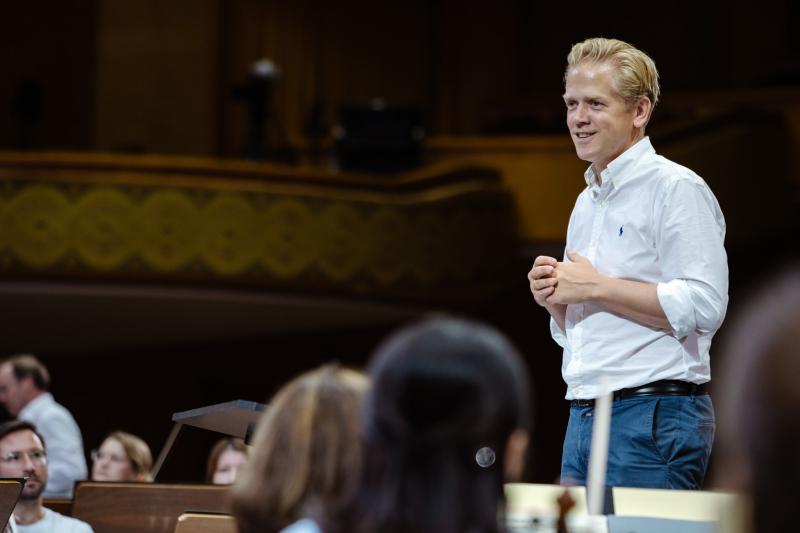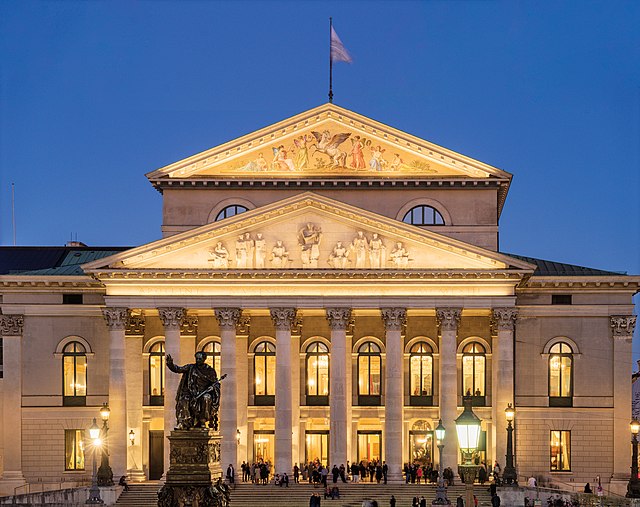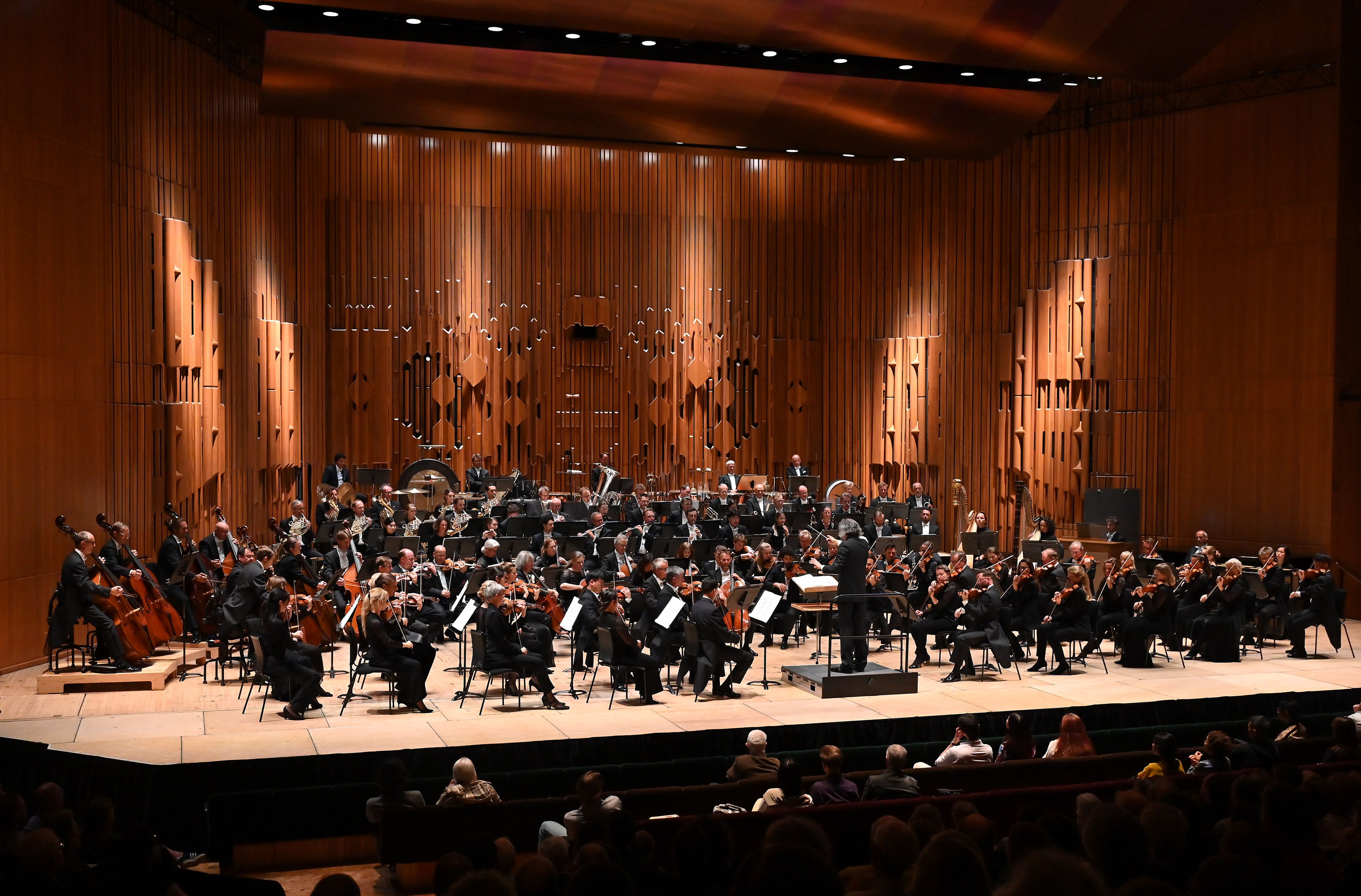First Person: the Bayerisches Staatsorchester's Managing Director Guido Gärtner on its 500th anniversary | reviews, news & interviews
First Person: the Bayerisches Staatsorchester's Managing Director Guido Gärtner on its 500th anniversary
First Person: the Bayerisches Staatsorchester's Managing Director Guido Gärtner on its 500th anniversary
Reflections as the Bavarians give two Barbican concerts under Vladimir Jurowski

Nine cities in seven countries; all in all, eleven concerts, on top of that, an appearance at home in Munich. Celebrating its 500th anniversary, the Bayerisches Staatsorchester is currently on an extended journey. We have been looking forward with great anticipation to this tour during which we are aiming to present everything from our longstanding tradition that has stood the test of time and share it with a great number of music lovers throughout Europe.
The Bayerisches Staatsorchester (Bavarian State Orchestra) can count itself lucky to be able to call the National Theatre in Munich home (pictured below). This space, where members come together for performances of opera, ballet, and symphonic music, but also for rehearsals, is much more than a workplace. It is a home in which a multitude of memories are shared. For our orchestra, being rooted in the centre of Munich at the Max-Joseph-Platz, as an integral part of the great organism that is the Bayerische Staatsoper, is the core of its existence. At home, not just in the pit, but also on the stage of the National Theatre, the Bayerisches Staatsorchester with its Musical Academy is also one of the world’s oldest concert orchestras. It has made an important contribution to the city’s cultural fabric from as early as 1811.  In that year, Maximilian Joseph I of Bavaria issued an order that still maintains its effect today. This order, which says a lot about the far-sightedness of the artists involved and their king, granted the musicians of the court orchestra of that time “to be allowed, on such festival days when no theatre performances are allowed, to give big concerts in the Royal Playhouse and during the winter a number of subscription concerts in the Royal ‘Redouten-Saal’". With that, the Musikalische Akademie was born and, with the “Akademiekonzerte” under royal protection, the first symphonic concert series in Munich too – since then accounted for by the orchestra members themselves.
In that year, Maximilian Joseph I of Bavaria issued an order that still maintains its effect today. This order, which says a lot about the far-sightedness of the artists involved and their king, granted the musicians of the court orchestra of that time “to be allowed, on such festival days when no theatre performances are allowed, to give big concerts in the Royal Playhouse and during the winter a number of subscription concerts in the Royal ‘Redouten-Saal’". With that, the Musikalische Akademie was born and, with the “Akademiekonzerte” under royal protection, the first symphonic concert series in Munich too – since then accounted for by the orchestra members themselves.
In the Academy Concerts the orchestra has been and continues to be influenced by great and, often, legendary conductors, such as Hans von Bülow, Richard Strauss, Hermann Levi, Bruno Walter, Carlos Kleiber, Wolfgang Sawallisch, Zubin Mehta, Kirill Petrenko and Vladimir Jurowski. Some of the most important musicians of their times, such as Johannes Brahms, Clara Schumann, Edvard Grieg and Richard Strauss to name a few, contributed to the Academy Concerts as visiting artists.
Richard Strauss conducts the Bayerisches Staatsorchester in Eine Alpensinfonie (recorded in 1941)
The Bayerisches Staatsorchester can thus consider itself fortunate to be at home in the world of opera as well as that of concert performances, embracing both within its essence. Even though these two worlds may differ, they also complement one another. The exactitude and cohesion gained in the concert hall make their presence felt from the orchestra pit during opera performances too. Equally, spontaneity and agility as well as an instinct for drama and affect are so ingrained within the soul of the Bayerisches Staatsorchester that they manifest with the same intensity on the podium.
Performing as a concert orchestra in contrast to opera, our ensemble functions as an artistically self-contained, and thus, spatially untethered collective. This autonomy offers the musicians the welcome opportunity to travel.
To this end, the Musical Academy has founded its own company – the Bayerisches Staatsorchester Konzert GmbH – which organises all activities outside of the opera service in the narrower sense and which I have had the honour to be in charge of as Managing Director since 2012, alongside my duties as violinist in the orchestra. In addition to touring, the company’s fields of activity also include the in-house label Bayerische Staatsoper Recordings, which was launched as a joint venture with the opera house in 2021 and which has made quite an impact in its augural year when it won no less than four accolades at the prestigious Gramophone Awards in 2022. (Pictured below by Mark Allan: Vladimir Jurowski conducting the Bayerisches Staatsorchester at the Barbican last night, 18 September)  It is with a great sense of joy and pride that the Bayerisches Staatsorchester, as ambassador for the Bayerische Staatsoper, Munich, and Bavaria, regularly embarks on a mission to convey its excellence and tradition to the wider world. In previous years, the ensemble has enhanced its presence as a symphonic orchestra thanks to concert performances in musical centres such as New York, London, Paris, Lucerne, Vienna, Berlin, Hamburg, Taipei, Seoul and Tokyo.
It is with a great sense of joy and pride that the Bayerisches Staatsorchester, as ambassador for the Bayerische Staatsoper, Munich, and Bavaria, regularly embarks on a mission to convey its excellence and tradition to the wider world. In previous years, the ensemble has enhanced its presence as a symphonic orchestra thanks to concert performances in musical centres such as New York, London, Paris, Lucerne, Vienna, Berlin, Hamburg, Taipei, Seoul and Tokyo.
As is the case with every ensemble operating on the international stage, it is a top priority for the Bayerisches Staatsorchester to allow concert audiences beyond Munich to access and experience it. But concertare stands not only for harmony, but also competition – and the Bayerisches Staatsorchester is intent upon asserting its position among the leading symphony orchestras in the music capitals of the world and at the most renowned festivals. In doing so, it seeks to live up to both its own expectations and its reputation. It goes without saying that performing in the city of London ranks among the greatest honours for any music ensemble, and we are thrilled to be back at the Barbican where so many admired artists have entered the stage before.
Above all, a tour allows the orchestra to evolve. Through the synergy of orchestra, conductor and soloists, interpretations grow and mature from place to place. Being frequently required to adapt to a new venue, its acoustic characteristics, and its audience demands and develops enormous versatility. Furthermore, travel strengthens the orchestra members’ relationships and sense of belonging.
A short film in German about the 500th anniversary, including an excerpt of Jurowski conducting the Meistersinger Prelude
With Richard Wagner’s Prelude to Tristan und Isolde and Richard Strauss’ Eine Alpensinfonie, the programmes contain works by two “house gods” of the Bayerische Staatsoper: Wagner’s opera was first performed by our orchestra in 1865, and Strauss was at the helm of our orchestra for several years in the 1890s. Other works in the setlists, namely by Robert Schumann, Anton Bruckner, Gustav Mahler, Alban Berg and the Ukrainian composer Victoria Poleva, show the wide stylistic range of the Bayerisches Staatsorchester. Louise Alder and Elsa Dreisig (soprano), Yefim Bronfman (piano) and Vilde Frang (violin) are the distinguished soloists who accompany us on the journey. The musical direction of all concerts is in the hands of our General Music Director, Vladimir Jurowski.
In travelling, the idea of departure already contains within it the thought of return. And so it is that the Bayerisches Staatsorchester is always happy to return to its beloved home – carrying with it a precious bundle of shared experiences and memories.
- Second Bayerisches Staatsorchester/Jurowski concert tonight: Wagner Tristan Prelude, Schumann Piano Concerto with Yefim Bonfman and Mahler's Fourth Symphony with Louise Alder
- Classical reviews on theartsdesk; Boyd Tonkin's review of the Monday concert will appear later today
The future of Arts Journalism
You can stop theartsdesk.com closing!
We urgently need financing to survive. Our fundraising drive has thus far raised £49,000 but we need to reach £100,000 or we will be forced to close. Please contribute here: https://gofund.me/c3f6033d
And if you can forward this information to anyone who might assist, we’d be grateful.

Subscribe to theartsdesk.com
Thank you for continuing to read our work on theartsdesk.com. For unlimited access to every article in its entirety, including our archive of more than 15,000 pieces, we're asking for £5 per month or £40 per year. We feel it's a very good deal, and hope you do too.
To take a subscription now simply click here.
And if you're looking for that extra gift for a friend or family member, why not treat them to a theartsdesk.com gift subscription?
more Classical music
 Kilsby, Parkes, Sinfonia of London, Wilson, Barbican review - string things zing and sing in expert hands
British masterpieces for strings plus other-worldly tenor and horn - and a muscular rarity
Kilsby, Parkes, Sinfonia of London, Wilson, Barbican review - string things zing and sing in expert hands
British masterpieces for strings plus other-worldly tenor and horn - and a muscular rarity
 From Historical to Hip-Hop, Classically Black Music Festival, Kings Place review - a cluster of impressive stars for the future
From quasi-Mozartian elegance to the gritty humour of a kitchen inspection
From Historical to Hip-Hop, Classically Black Music Festival, Kings Place review - a cluster of impressive stars for the future
From quasi-Mozartian elegance to the gritty humour of a kitchen inspection
 Shibe, LSO, Adès, Barbican review - gaudy and glorious new music alongside serene Sibelius
Adès’s passion makes persuasive case for the music he loves, both new and old
Shibe, LSO, Adès, Barbican review - gaudy and glorious new music alongside serene Sibelius
Adès’s passion makes persuasive case for the music he loves, both new and old
 Anja Mittermüller, Richard Fu, Wigmore Hall review - a glorious hall debut
The Austrian mezzo shines - at the age of 22
Anja Mittermüller, Richard Fu, Wigmore Hall review - a glorious hall debut
The Austrian mezzo shines - at the age of 22
 First Person: clarinettist Oliver Pashley on the new horizons of The Hermes Experiment's latest album
Compositions by members of this unusual quartet feature for the first time
First Person: clarinettist Oliver Pashley on the new horizons of The Hermes Experiment's latest album
Compositions by members of this unusual quartet feature for the first time
 Gesualdo Passione, Les Arts Florissants, Amala Dior Company, Barbican review - inspired collaboration excavates the music's humanity
At times it was like watching an anarchic religious procession
Gesualdo Passione, Les Arts Florissants, Amala Dior Company, Barbican review - inspired collaboration excavates the music's humanity
At times it was like watching an anarchic religious procession
 Classical CDs: Camels, concrete and cabaret
An influential American composer's 90th birthday box, plus British piano concertos and a father-and-son duo
Classical CDs: Camels, concrete and cabaret
An influential American composer's 90th birthday box, plus British piano concertos and a father-and-son duo
 Cockerham, Manchester Camerata, Sheen, Martin Harris Centre, Manchester review - re-enacting the dawn of modernism
Two UK premieres added to three miniatures from a seminal event of January 1914
Cockerham, Manchester Camerata, Sheen, Martin Harris Centre, Manchester review - re-enacting the dawn of modernism
Two UK premieres added to three miniatures from a seminal event of January 1914
 Kempf, Brno Philharmonic, Davies, Bridgewater Hall, Manchester review - European tradition meets American jazz
Bouncing Czechs enjoy their Gershwin and Brubeck alongside Janáček and Dvořák
Kempf, Brno Philharmonic, Davies, Bridgewater Hall, Manchester review - European tradition meets American jazz
Bouncing Czechs enjoy their Gershwin and Brubeck alongside Janáček and Dvořák
 Solomon, OAE, Butt, QEH review - daft Biblical whitewashing with great choruses
Even a top soprano and mezzo can’t make this Handel paean wholly convincing
Solomon, OAE, Butt, QEH review - daft Biblical whitewashing with great choruses
Even a top soprano and mezzo can’t make this Handel paean wholly convincing
 Two-Piano Gala, Kings Place review - shining constellations
London Piano Festival curators and illustrious friends entertain and enlighten
Two-Piano Gala, Kings Place review - shining constellations
London Piano Festival curators and illustrious friends entertain and enlighten
 Echo Vocal Ensemble, Latto, Union Chapel review - eclectic choral programme garlanded with dance
Beautiful singing at the heart of an imaginative and stylistically varied concert
Echo Vocal Ensemble, Latto, Union Chapel review - eclectic choral programme garlanded with dance
Beautiful singing at the heart of an imaginative and stylistically varied concert

Add comment